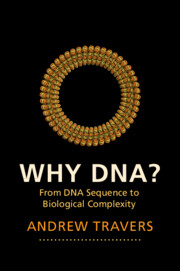Book contents
- Why DNA?
- Frontispiece
- Why DNA?
- Copyright page
- Contents
- Preface
- Acknowledgements
- 1 The Perennial Question
- 2 The Nature of Biological Information
- 3 DNA
- 4 The Evolution of Biological Complexity
- 5 Cooperating Genomes
- 6 DNA, Information and Complexity
- 7 Origins of Complexity
- 8 The Complexity of Societies
- 9 Why DNA
- General Reading and Bibliography
- Index
8 - The Complexity of Societies
Published online by Cambridge University Press: 05 May 2022
- Why DNA?
- Frontispiece
- Why DNA?
- Copyright page
- Contents
- Preface
- Acknowledgements
- 1 The Perennial Question
- 2 The Nature of Biological Information
- 3 DNA
- 4 The Evolution of Biological Complexity
- 5 Cooperating Genomes
- 6 DNA, Information and Complexity
- 7 Origins of Complexity
- 8 The Complexity of Societies
- 9 Why DNA
- General Reading and Bibliography
- Index
Summary
A central issue in modern biology is the question of the mechanism of evolution of social groups. Such groups are considered to be integral components of biological complexity (Mayr, 1963), and the discussion of this point has been one of the most animated – and often the most sterile – debates in biological thinking. It is often framed as a distinction between kin selection, driven by altruistic behaviour by members of a family group sharing a panoply of genes, and group selection where the cohesion of the group, and not necessarily genetic relatedness, is the driving factor.
Information
- Type
- Chapter
- Information
- Why DNA?From DNA Sequence to Biological Complexity, pp. 171 - 181Publisher: Cambridge University PressPrint publication year: 2022
